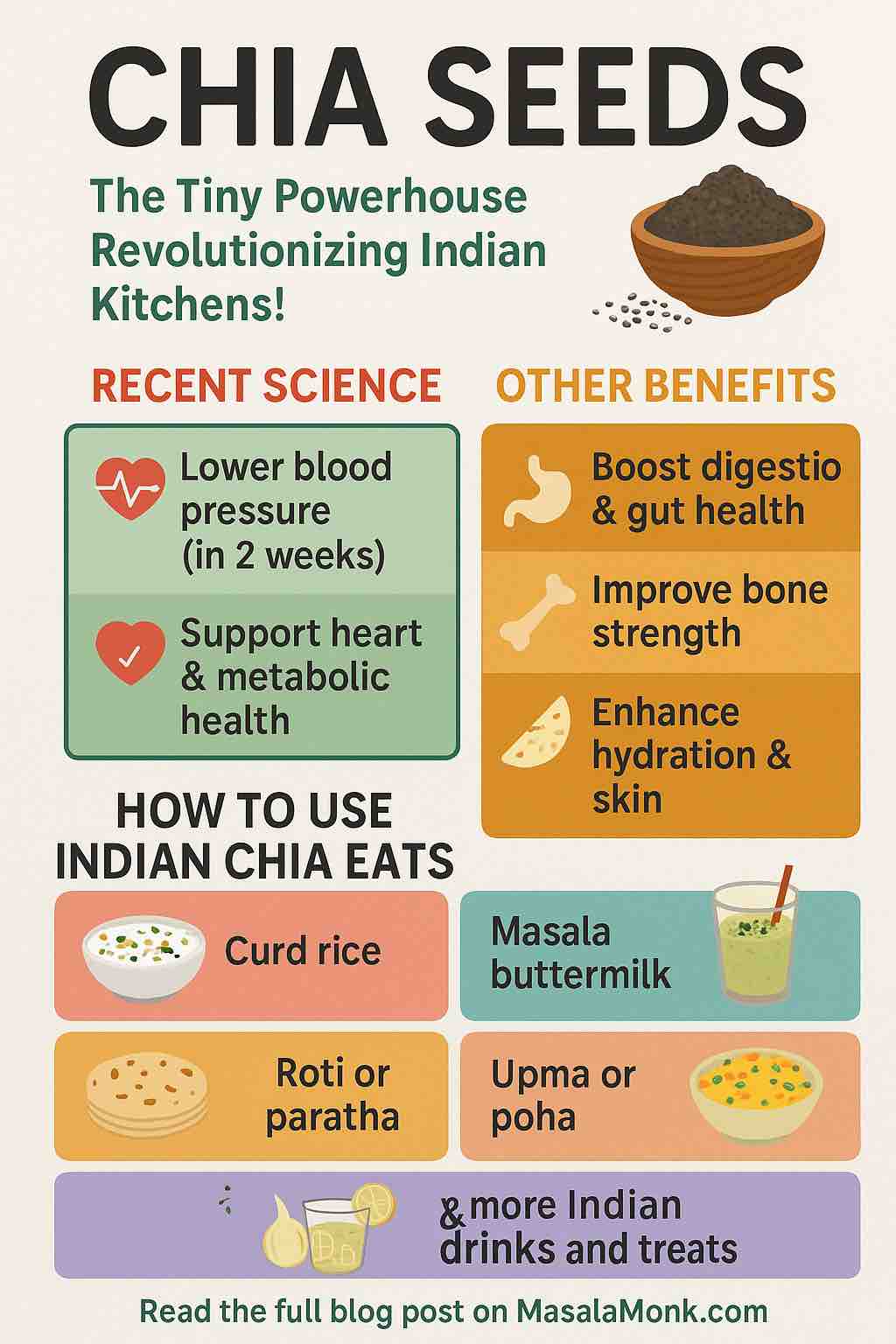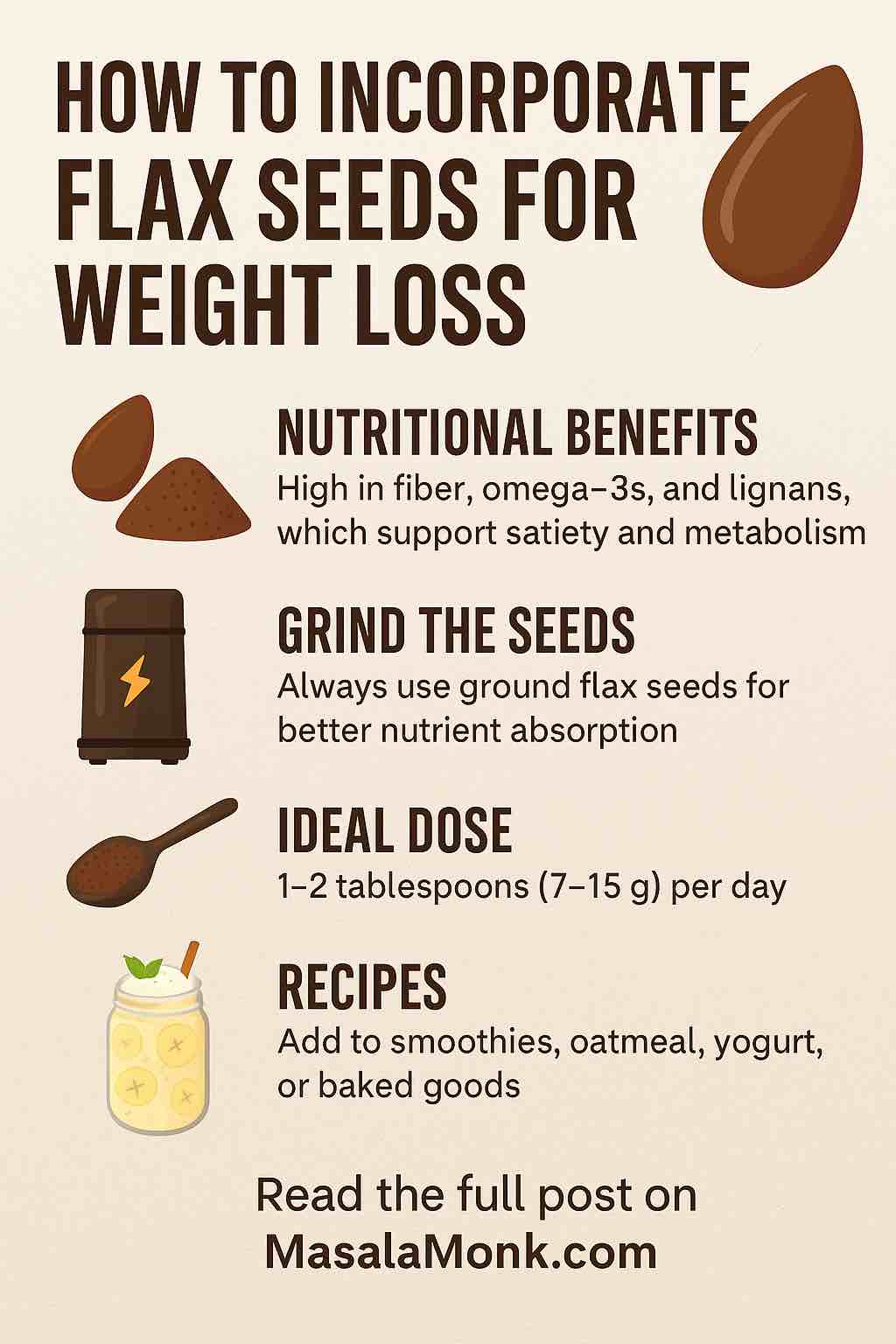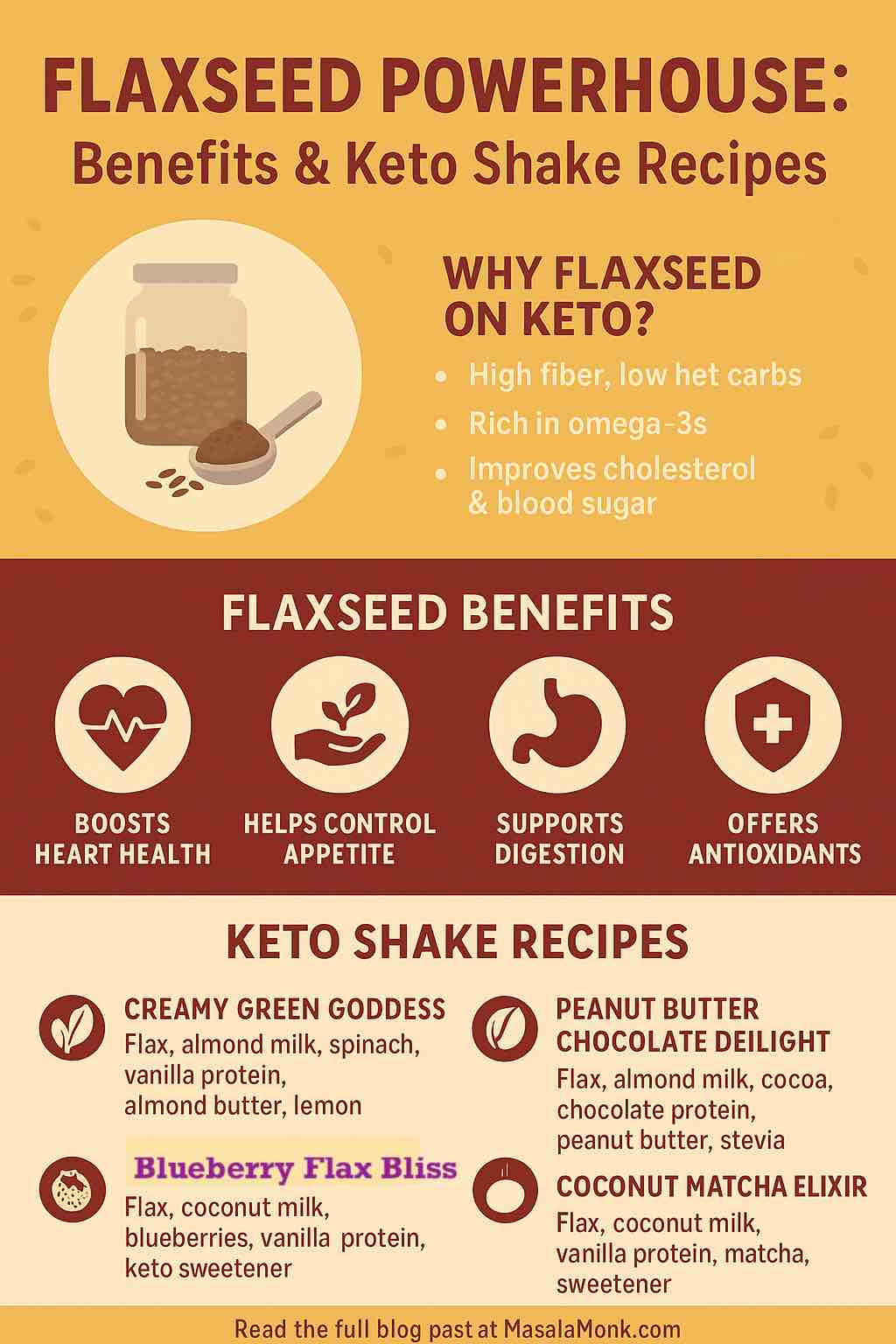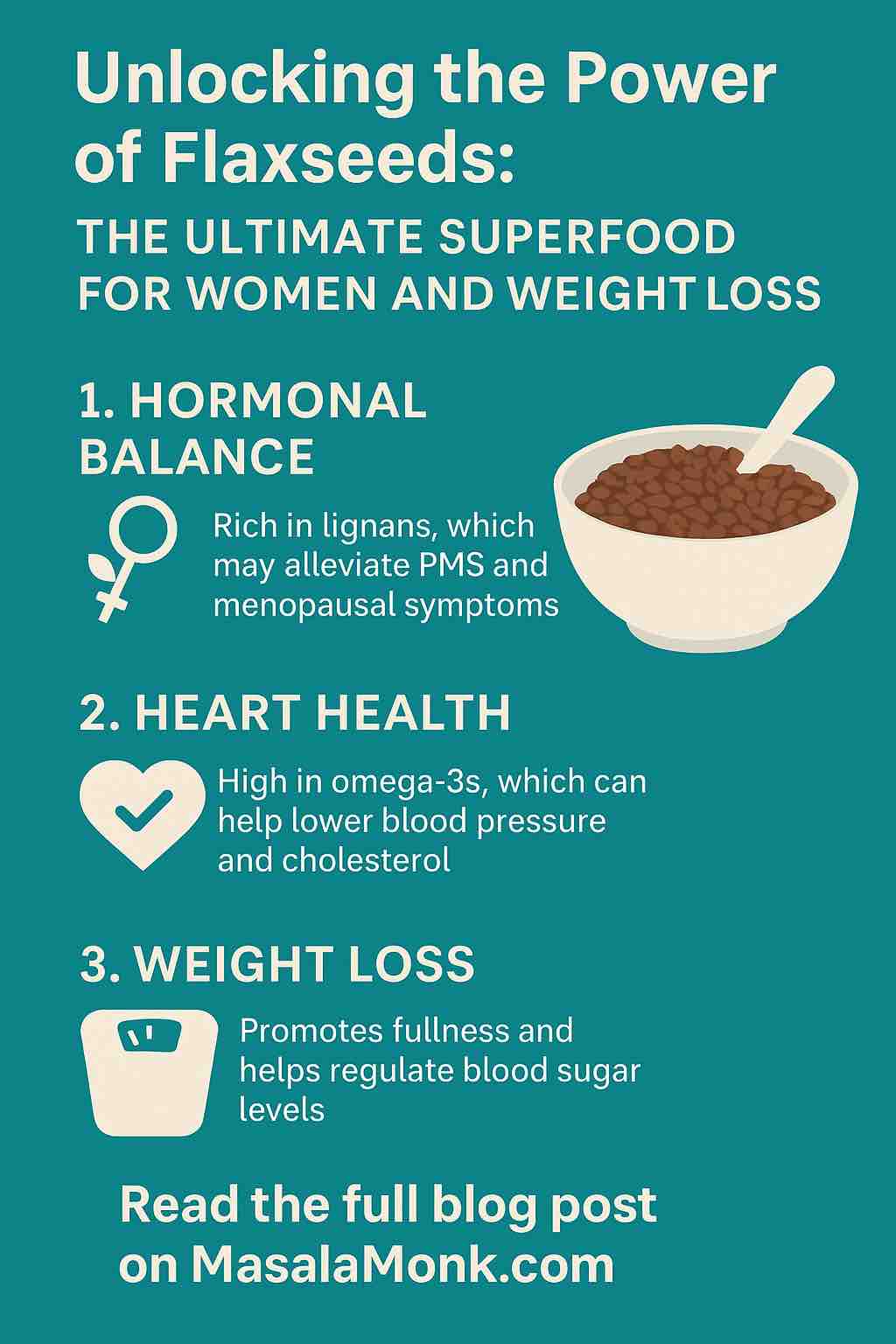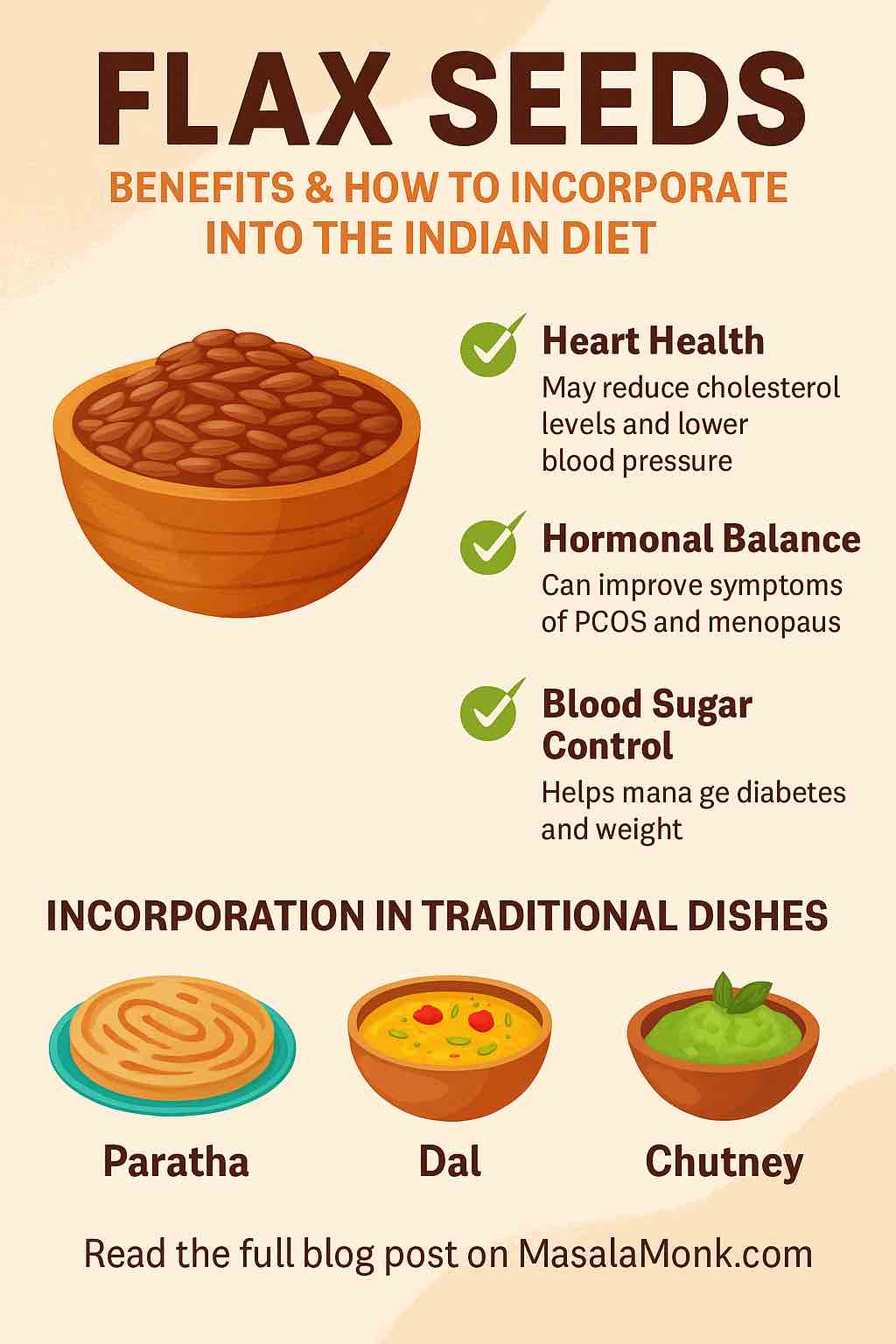
There’s a reason ancient civilizations revered flax seeds (“Alsi” in Hindi)—and modern science is only adding to the hype! From boosting heart health to improving hormonal balance, flax seeds have quietly become a nutrition superstar. Yet, most Indian kitchens haven’t unlocked their full potential.
If you’re curious about easy, Indian-friendly ways to add this powerhouse seed to your meals, or just want the latest scientific scoop, you’re in the right place. Let’s dive in!
Section 1: What Are Flax Seeds and Why All the Buzz?
Flax seeds are tiny, flat, brown or golden seeds harvested from the flax plant (Linum usitatissimum). They’ve been consumed for thousands of years but have only recently hit the mainstream thanks to new research revealing their wide-ranging health benefits.
So what makes flax seeds so special?
- Loaded with Omega-3 (ALA) – Rare for plant foods, this fatty acid supports heart, brain, and joint health.
- Fiber Powerhouse – Both soluble and insoluble fiber for better gut, lower cholesterol, and stable blood sugar.
- Lignan Rich – Plant antioxidants with unique hormone-balancing and anti-cancer potential.
- Quality Plant Protein – Perfect for vegetarians/vegans.
- Versatile in the Kitchen – Easily added to Indian meals without compromising on taste.
Section 2: Science-Backed Benefits of Flax Seeds
1. Heart Health & Cholesterol
Numerous clinical trials and meta-analyses now confirm: flax seeds lower total and LDL (bad) cholesterol, modestly lower blood pressure, and improve overall cardiovascular health. This is largely thanks to their combination of ALA, fiber, and lignans.
2. Blood Sugar Control
Regular flax seed intake helps manage blood glucose and insulin resistance, especially helpful for people with type 2 diabetes or those at risk.
3. Weight Management
Fiber and healthy fats keep you fuller for longer, curb cravings, and support healthy weight loss—supported by several randomized trials.
4. Hormonal Balance (PCOS, Menopause, PMS)
Recent studies (2024–2025) show daily flax can:
- Reduce PCOS-related hormonal imbalances (normalizing FSH, LH ratios).
- Ease perimenopausal and menopausal symptoms such as hot flashes and mood swings.
- Provide gentle support for menstrual regularity.
5. Gut Health & Immunity
Flax seeds act as prebiotics, supporting a diverse gut microbiome and lowering inflammation markers like CRP and IL-6.
6. Liver Health (NAFLD/MASLD)
Flax seed supplementation improves liver enzymes, reduces fatty deposits, and boosts beneficial gut bacteria, especially in people with fatty liver disease.
7. Cancer Prevention
While evidence is still emerging, high lignan content is linked to lower risk of hormone-related cancers (breast, prostate).
Section 3: The Indian Dilemma—How to Eat Flax Seeds Without Compromising Taste
Here’s the real challenge: How do you add flax seeds to your daily Indian meals without feeling like you’re swallowing sawdust?
Key Tips for Maximum Nutrition
- Always Use Ground Flax Seeds
Whole flax seeds often pass undigested. Buy whole, lightly roast, and grind in small batches. Store in an airtight container in the fridge. - Start Small
Begin with 1 teaspoon daily, and work up to 1–2 tablespoons (about 10–30 g), adjusting based on your gut tolerance. - Hydrate
Fiber needs water! Drink plenty throughout the day. - Be Consistent
Benefits come with regular use over 8–12+ weeks.
Section 4: 10 Easy Indian Ways to Use Flax Seeds (With Practical Recipes)
1. Paratha/Chapati Dough
Add 1–2 tbsp ground flax seeds to your daily dough for rotis, parathas, or theplas. You won’t even notice the difference in taste!
2. Dals and Curries
Finish your dal, sambhar, or sabzi with 1 tbsp of ground flax. Add at the end—don’t cook for too long to preserve nutrients.
3. Chutneys and Podis
- Flax Seed Chutney:
Roast 2 tbsp flax, blend with coconut, mint, chilies, and salt for a nutrient-packed side. - Flax Podi:
Dry roast flax with sesame, cumin, and chilies. Grind to a coarse powder. Sprinkle on rice, idlis, or dosa.
4. Flax Laddoos
Mix ground flax with dates, nuts, and a bit of ghee or nut butter. Shape into energy balls for a portable, healthy snack—especially for kids and elders.
5. Breakfast Boosters
- Poha/Upma: Add 1 tbsp flax at the end of cooking.
- Porridge: Stir flax into oats or daliya.
- Curd/Yogurt: Mix flax, fruit, and a touch of honey.
6. Beverages
Add ground flax to buttermilk, lassi, or smoothies.
Pro tip: It adds creaminess without altering taste.
7. Egg Substitute in Baking
Mix 1 tbsp flax meal with 3 tbsp water, let sit for 5 min—replaces one egg in cakes, muffins, or pancakes.
8. Healthy Toppings
Sprinkle on salads, fruit chaat, bhel, or even on raita for an omega-3 punch.
9. Soups & Stews
Stir in towards the end for thickening and nutritional boost.
10. Namkeen and Snack Mixes
Roast flax seeds with peanuts, curry leaves, and mild spices for a crunchy, fiber-rich snack.
Section 5: Who Should Be Careful?
- People with bowel disorders: Start with a small amount, as too much fiber too quickly can cause bloating or discomfort.
- Pregnant/breastfeeding women: Stick to food-level (culinary) use; consult your doctor for large, regular doses.
- People on blood thinners: Flax can mildly impact clotting.
Section 6: Frequently Asked Questions
1. How much flax seed should I eat daily for health benefits?
The ideal amount is 1–2 tablespoons (10–20 grams) of ground flax seeds per day for most adults. Start with a teaspoon and increase gradually to avoid digestive discomfort.
2. Should I eat flax seeds whole or ground?
Always consume flax seeds ground or as a powder. Whole seeds may pass through your digestive tract undigested, so you’ll miss out on their nutrients.
3. Can I cook flax seeds? Will heating destroy the nutrients?
Light roasting is fine and even enhances flavor. Avoid prolonged, high-heat cooking, but adding ground flax to warm food or during final cooking is perfectly safe and effective.
4. Are there any side effects of eating flax seeds?
Some people experience gas or bloating if they eat too much too quickly. Increase your intake gradually and drink plenty of water. Rarely, allergic reactions or digestive discomfort can occur.
5. Can children and elderly people eat flax seeds?
Yes. For young children, start with ¼–½ teaspoon a day; for elders, start with ½–1 teaspoon. Adjust amounts based on tolerance and consult a doctor for any health conditions.
6. Is there a difference between brown and golden flax seeds?
Both are nutritionally very similar and can be used interchangeably. Choose whichever is easily available or affordable.
7. How do I store flax seeds to keep them fresh?
Store whole seeds in a cool, dry place for up to a year. Ground flax should be kept in an airtight container in the refrigerator and used within 2–4 weeks for best freshness and nutrition.
8. Can flax seeds be eaten during pregnancy or breastfeeding?
Flax seeds are safe in food amounts, but large medicinal doses should be avoided unless prescribed by a doctor. Always consult your healthcare provider before making dietary changes during pregnancy or lactation.
9. Do flax seeds interact with any medicines?
Flax seeds may slightly affect blood clotting and blood sugar, so if you’re on anticoagulants or diabetes medication, consult your doctor before regular, large consumption.
10. What are some quick Indian recipes to use flax seeds daily?
Mix ground flax into roti dough, sprinkle on dal or sabzi, stir into chutneys or curd, add to smoothies, or make flax seed ladoos for a healthy snack. See the blog above for more ideas!
Section 7: Sample 1-Day Indian Meal Plan with Flax Seeds
Breakfast:
Poha with 1 tbsp ground flax stirred in before serving + curd
Lunch:
Chapati with 1 tbsp flax in dough + palak dal (add 1 tbsp flax meal while tempering) + salad sprinkled with flax
Snack:
Flax seed laddoo + tea
Dinner:
Brown rice, vegetable curry with flax meal + flax podi on the side
Beverages:
Buttermilk or smoothie with 1 tsp flax
Conclusion: Small Seed, Big Impact
Flax seeds may be tiny, but their health punch is huge. They’re affordable, versatile, and easy to add to your favorite Indian meals without changing your family’s tastes or traditions. Science shows that regular, moderate intake (1–2 tbsp/day) can help with heart, hormone, gut, and liver health—sometimes within just weeks.
Start today—roast, grind, sprinkle, and enjoy!
Want more?
Let me know if you’d like downloadable recipe cards, weekly meal plans, or the latest scientific studies for a particular health issue.
Your health journey can start with just one tiny seed—give flax a place in your Indian kitchen today!

